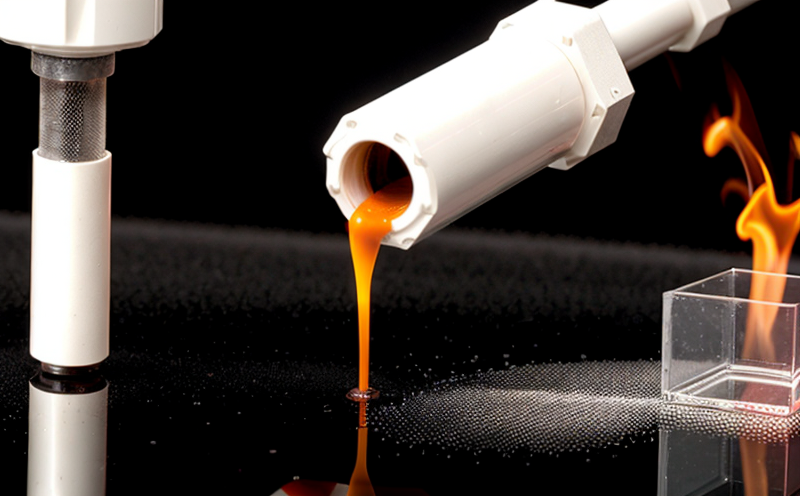ISO 2578 Heat Resistance of Nanostructured Polymers with Nano Additives
The ISO 2578 standard is a critical tool in understanding and ensuring the durability of nanostructured polymers reinforced or modified by nanomaterials. These materials are increasingly used across various sectors, including electronics, automotive, aerospace, and medical devices, due to their enhanced mechanical properties such as strength, flexibility, and thermal stability.
The standard is particularly relevant for assessing how these advanced materials behave under heat stress conditions which can lead to degradation or loss of performance characteristics. By simulating real-world operating environments through controlled tests, ISO 2578 provides a standardized approach that ensures consistent results across different laboratories worldwide. This is crucial for industries relying on nanomaterials where high reliability and quality are paramount.
The test procedure involves exposing specimens made from nanostructured polymers containing various types of nanoparticles (e.g., carbon nanotubes, metal oxides) to elevated temperatures over specified durations. Specimens must be prepared carefully following stringent guidelines provided in the standard to ensure accurate representation of actual product performance. Post-test evaluation focuses on measuring changes in physical properties like tensile strength, modulus, and chemical composition.
Understanding heat resistance is essential as it directly impacts a material's lifespan and operational integrity under extreme conditions. For instance, electronic components made from such polymers need to withstand high temperatures without failure during manufacturing processes or end-use scenarios involving heat generation. Automotive parts also benefit greatly by improving safety standards through reduced weight while maintaining robustness against harsh environmental factors like temperature fluctuations.
Accurate testing according to ISO 2578 helps manufacturers make informed decisions about material selection, process optimization, and quality assurance practices. Compliance with this international standard enhances trust among stakeholders involved in supply chains and end-users who rely heavily on reliable performance from nanomaterials-based products.
Why It Matters
The significance of assessing heat resistance using ISO 2578 cannot be overstated, especially when dealing with nanostructured polymers containing nanoparticles. As these materials become more prevalent in diverse applications ranging from consumer electronics to heavy machinery, ensuring they can endure operational temperatures without compromising safety or performance becomes increasingly important.
One key aspect emphasized by this standard is the potential impact of heat on nanomaterials within polymer matrices during processing and use phases. For example, in high-temperature environments found in automotive engines or aerospace components, prolonged exposure to elevated temperatures could lead to degradation of both the polymer base and incorporated nanoparticles. Such changes might result in reduced mechanical strength, increased brittleness, or altered chemical composition—all factors that could compromise product reliability.
Another critical consideration is the interaction between heat and nanomaterials during processing stages such as extrusion, injection molding, or composite fabrication. During these processes, temperatures can exceed those experienced by final products, necessitating thorough evaluation to ensure compatibility between different elements of a nanostructured polymer system. Properly conducted tests according to ISO 2578 help identify any adverse effects arising from such high-temperature interactions.
In addition to enhancing product quality and safety, compliance with this standard fosters innovation by enabling researchers and developers to explore new possibilities in nanomaterial design and integration into existing systems. By providing a standardized framework for evaluating heat resistance, ISO 2578 facilitates comparison between different materials and encourages the development of more robust and versatile nanostructured polymers.
Industry Applications
- Aerospace: Ensuring lightweight yet durable materials used in spacecraft structures and engines can withstand extreme heat without degrading.
- Automotive: Evaluating heat resistance of materials employed in engine components, exhaust systems, and other high-temperature applications.
- Electronics: Assessing the performance of nanocomposites utilized in circuit boards, connectors, and other electronic assemblies that may experience significant thermal stress.
- Bio-medical: Determining how medical devices fabricated from nanostructured polymers behave under heat during sterilization processes or prolonged storage at elevated temperatures.
Use Cases and Application Examples
In the aerospace sector, manufacturers often use nanocomposites reinforced with carbon nanotubes to create lightweight yet strong aircraft structures. These materials must be tested for heat resistance because they will operate in environments where temperatures can reach several hundred degrees Celsius during flight operations.
Automotive companies frequently employ nanostructured polymers containing metal oxides as insulating layers within batteries or thermal management systems due to their excellent electrical and thermal properties respectively. Testing according to ISO 2578 ensures these materials remain effective throughout the battery's lifecycle, including charging cycles which generate significant heat.
Electronics firms increasingly incorporate nanomaterials into circuit boards and connectors designed for use in high-performance computing equipment or military applications where temperature management is crucial. Proper testing helps guarantee reliable operation under demanding thermal conditions without compromising performance.
Bio-medical device producers rely on ISO 2578 to assess heat resistance of materials used in implantable devices like bone plates, stents, and catheters that must withstand sterilization processes at temperatures exceeding 100°C. Ensuring these materials maintain their integrity is vital for patient safety.





